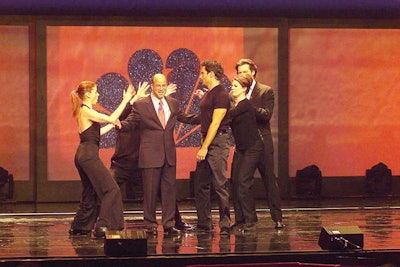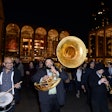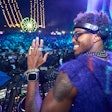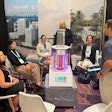
The television industry’s big upfront presentations in May meant long hours of watching TV show clips and carefully chosen entertainment acts for the advertising executives in attendance. It meant even longer hours of preparation for the event planners charged with making the presentations memorable enough to get those advertisers to part with their money. But it didn’t mean much of a break in the business-as-usual approach to the week.
For nearly 40 years, television networks have put on these sales presentations for advertisers, and one critique is that the process hasn’t changed enough. “They kind of follow a formula,” said one reporter covering the week. “I can only surmise they don't want to frighten advertisers by doing anything different or interesting.” (We won’t even ask what he thought of the new shows.)
This year’s events followed the tried-and-true formula of executives spouting research data intermixed with introductions of new and old network talent and clips from shows. The major networks strutted their stuff at familiar locales: CBS presented for a third year at Carnegie Hall, NBC went to Lincoln Center, and Fox held its event at City Center. The one small surprise: ABC went to Radio City Music Hall, which has hosted NBC for the past two years.
Brenda Major, ABC’s vice president of conference planning and special events, explained that the network moved to Radio City because it already had access to the venue for ABC’s broadcast of the Daytime Emmys there later in the week. “The venue is more expensive than normal, but the seating capacity is larger,” she said. “It’s a good trade-off because we want to invite as many clients as possible.” After the presentation, ABC shuttled nearly 2,000 guests to the after-party at Cipriani 42nd Street in 25 Campus Coach buses. Major says her budget for the party “remained flat” from last year, and she brought back Mille Fiori for decor.
One thing that was different about Upfront Week, however, was the presence of a newcomer. Clear Channel isn’t a TV network, but Mark Kirby, senior vice president of activation and brand management for its marketing division, wanted to sell the Upfront audience on the company’s radio, outdoor, online and live entertainment advertising venues.
“We thought it was important for us to be the first one out of the gate, so we went for the 9:30 a.m. start to get in front of the NBC presentation later that day,” Kirby said. More than 800 people showed up at the Ford Center for the Performing Arts for breakfast from Great Performances and performances by Jewel and the cast of The Producers. Kirby wouldn’t share his budget, but claimed Clear Channel didn’t spend as freely as some other networks. “There’s been a lot of debate about the usefulness of Upfront Week,” he said. “We wanted to add to that debate.”
Jack Myers, editor and founder of the Jack Myers Report, a newsletter that tracks and analyzes media trends, admits Upfront Week has fallen into a stylistic pattern, but it serves its purpose. “You can argue that [these presentations] are part of a broken system, but the fact is, they work,” he says. “The presentations and parties are very much a part of the process that networks use to define themselves and their message, and that buyers use to validate their decisions.”



















